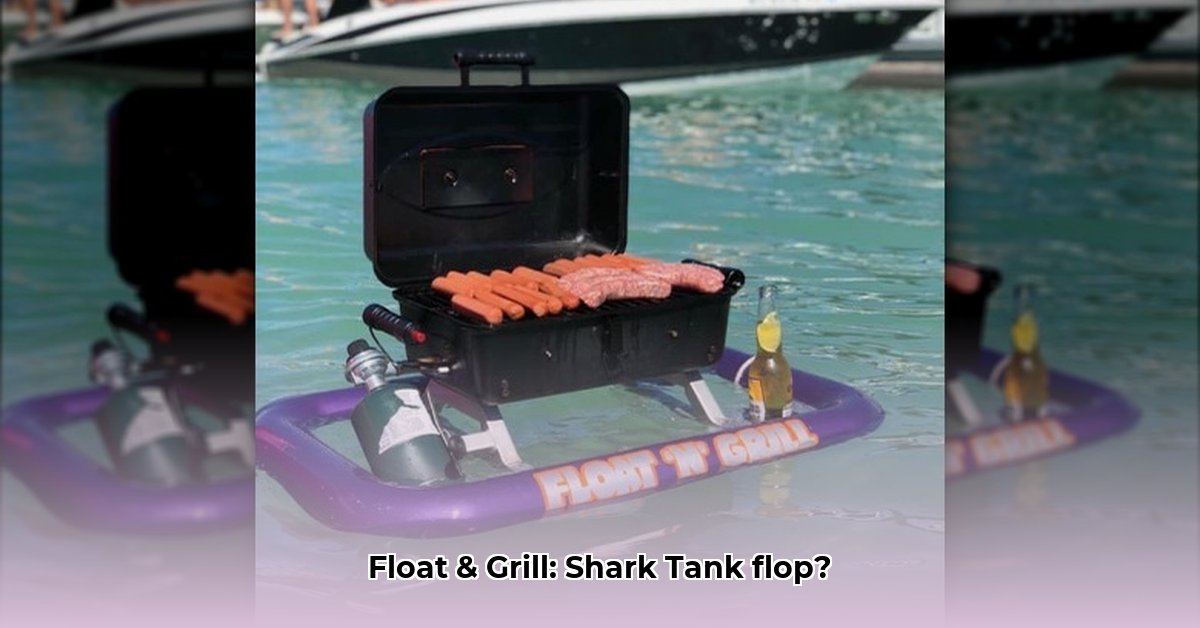
The meteoric rise and swift fall of Float 'N' Grill, a seemingly promising floating grill that secured a deal on Shark Tank, serves as a compelling case study in entrepreneurial missteps. While the initial viral marketing and Shark Tank appearance generated significant buzz, the company ultimately failed to translate this hype into sustainable profitability. For another example of a Shark Tank success story gone wrong, check out this analysis. This analysis dissects the contributing factors to Float 'N' Grill's demise, offering crucial lessons for aspiring entrepreneurs.
The Allure and the Demise of a Buoyant Grill
The innovative concept of a floating grill captivated millions. Viral Facebook videos showcased the product, creating immense anticipation. This early success culminated in a Shark Tank appearance and a deal with investor Daniel Lubetsky, seemingly setting the stage for substantial growth. However, despite this early momentum, Float 'N' Grill's net worth experienced a dramatic decline; the company's trajectory shifted from promising to disastrous. This case study examines why a product with such initial appeal ultimately failed.
The Shark Tank Effect: A Short-Lived Boost
Securing a deal with Daniel Lubetsky, a seasoned investor, signaled a potential turning point for Float 'N' Grill. The partnership not only provided financial backing but also access to Lubetsky's expertise in the grilling industry. Yet, a closer look at the financials reveals a concerning reality. Pre-Shark Tank sales amounted to a meager $19,400. This stark number highlights a critical disconnect between the perceived market demand and actual sales performance. While the Shark Tank exposure undoubtedly boosted brand awareness, it wasn't enough to overcome underlying weaknesses in the business model.
Key Factors Contributing to Float 'N' Grill's Failure
Several interconnected factors contributed to Float 'N' Grill's failure. These factors, detailed below, highlight the importance of comprehensive market analysis, strategic pricing, robust marketing, and solid intellectual property protection.
High Price Point: A Barrier to Entry
At $229, Float 'N' Grill's retail price was significantly higher than competing portable grills. While the unique features justified this price in the minds of the founders, the market clearly disagreed. Consumers were unwilling to pay a premium for a novel product without a proven track record. This highlights the crucial need to align pricing with market demand and customer perception of value.
Patent Issues: A Legal Quagmire
Legal challenges related to Float 'N' Grill's patent significantly hindered its growth. The denial of a reissued patent hampered the company's ability to innovate and compete effectively. This legal setback underlines the importance of thorough patent research and protection from the outset. Proactive legal strategies are crucial for preventing costly and time-consuming disputes.
Marketing and Distribution Gaps: A Missed Opportunity
Despite initial Shark Tank hype, Float 'N' Grill's marketing and distribution strategies proved insufficient to sustain the initial burst of popularity. The lack of a long-term marketing plan led to a steep decline in brand visibility. The eventual removal of their website and Amazon presence further underlines these critical shortcomings. A robust, multifaceted marketing strategy is vital for building brand loyalty and ensuring consistent sales.
Inadequate Market Analysis: A Lack of Understanding
The lack of comprehensive market research is undeniably a major factor in Float 'N' Grill's downfall. The company failed to fully assess consumer preferences, competitive landscape, and the overall market potential for their product. Thorough market analysis is essential for understanding market demand and aligning product development and marketing strategies accordingly.
Financial Performance: A Troubling Picture
The available financial data paints a bleak picture. Pre-Shark Tank sales of $19,400 pale in comparison to the projected success. While post-Shark Tank sales figures are unavailable, it's highly probable they remained low, leading to a significant negative net worth. This financial reality starkly underscores the gap between initial expectations and the harsh realities of the marketplace.
Lessons Learned: Avoiding the Float 'N' Grill Fate
The Float 'N' Grill case offers several actionable lessons:
- Thorough Market Research: Conduct comprehensive market analysis to understand customer needs, price sensitivity, and competitive dynamics before product launch.
- Strategic Pricing: Align pricing with perceived value and market conditions to avoid pricing yourself out of the market.
- Robust Intellectual Property Protection: Secure comprehensive patent protection to avoid costly legal battles and safeguard your innovation.
- Sustainable Marketing Strategy: Develop a comprehensive, long-term marketing plan to maintain brand visibility and drive consistent sales.
- Efficient Distribution Channels: Establish effective distribution channels to ensure product availability to your target market.
Conclusion: A Cautionary Tale
The Float 'N' Grill story is a cautionary tale for entrepreneurs. A captivating product and primetime exposure are not enough to guarantee success. A lack of due diligence in market analysis, pricing strategy, and intellectual property protection, coupled with inadequate marketing and distribution, ultimately doomed this innovative concept. The lessons learned should serve as a valuable roadmap for anyone seeking to navigate the complexities of the entrepreneurial landscape. While a revived Float 'N' Grill is theoretically possible, it would require a complete overhaul of the business model, driven by a deep understanding of the market and a commitment to rectifying the past mistakes.